Duncan James was feeling quietly confident, and perhaps with good reason. “All the bookies were behind us,” he says. “Paddy Power had us as favourites to win.” It was 2011, and Blue – one of those rare British boybands whose career was stretching on into adulthood – had been tempted out of semi-retirement to represent the UK at Eurovision. The band had taken a break back in 2005, James says, “to pursue different areas of the entertainment business”. But the BBC, which screens the singing competition each year and helps oversee the UK’s choice of entry, had come calling because it found itself in a tight spot. After several years of poor (and sometimes catastrophic) results, they urgently required a safe pair of hands. Blue were already established, and enduringly popular. They’d excel, surely?
“Well, that was the hope,” James says.
The Eurovision song contest is the biggest singing competition in the world, a deliriously daft sing-off in which nations compete to win the favour of a TV audience of 161 million viewers, who can vote along with a jury of industry professionals. Flags are flown with pride, performances err on the side of kitsch and the whole thing runs in excess of four hours. By its climax, for one reason or another, everyone seems to be in tears.
The competition launched in 1956 to help bring previously warring nations together via the universal language of music. In its first four decades, the UK did well, often finishing in the top five. Sandie Shaw won it, barefoot, in 1967 with Puppet on a String. Cliff Richard came second a year later with Congratulations. In 1969, Lulu was victorious with Boom Bang-a-Bang, a song whose devotedly simplistic refrain set the competition’s tone for the next few years. Eurovision bolstered the career of Brotherhood of Man, who won with Save Your Kisses for Me in 1976, and launched Bucks Fizz in 1981. The UK has won five times, most recently in 1997 with Katrina and the Waves’ Love Shine a Light.
Since then, with the exception of Sam Ryder’s triumphant second-place showing last year, the UK has been routinely unremarkable, and occasionally downright awful. In the 21st century, we’ve placed last five times. And when we haven’t come last, we’ve tended to languish near the bottom. In 2006, Daz Sampson, a Stockport-based rapper, appeared with Teenage Life, a song that comprised a freestyle vocal more Roland Rat than Chuck D; he performed alongside dancers dressed as schoolgirls and came 19th. Three years previously, the Liverpudlian duo Jemini, whose members Chris Cromby and Gemma Abbey met at stage school, were our representatives with Cry Baby, “a very average song with a really terrible performance”, according to Paul Jordan, former Eurovision comms man who now offers media analysis every May as Dr Eurovision. (He completed his PhD in the nation branding of post-communist states, with a focus on Estonia’s journey at Eurovision.) Jemini, who sang off-key on the night and were awarded the dreaded nul points, split up soon after – though there had been rumours that they were re-forming for this year’s event.
In 2021, James Newman, a hitherto accomplished pop songwriter whose credits included tracks for Rudimental and Calvin Harris, also managed nul points with his song Embers, despite it being a perfectly decent up-tempo dance number. What went wrong? “It was a very uninspiring performance,” Jordan says. It’s true: Newman didn’t exactly own the stage. “Other acts,” Jordan says, “put on much bigger and better performances. It often is as simple as that.”
Back in 2011, then, Blue were judged to have the chops to make things good again with their Justin Timberlake-esque entry, I Can.
“For me, it was a dream come true,” says Duncan James, now 45. “I’d always been a massive fan – as a kid, it was the only night of the year I was allowed to stay up late to watch. I loved it.”
His fellow band members – Antony Costa, Simon Webbe and Lee Ryan – weren’t quite as keen. “Well, Antony was up for it, but the other two less so. I think they thought it was a bit cheesy. And, of course, the UK never does well, does it?” Friends advised caution, warning that Eurovision was camp, toe-curling and plainly ridiculous – the very same qualities that fans of the show consider to be central to its appeal.

Blue appeared, ultimately, because of the show’s global reach. How better to announce to the world that you’re back than in front of a couple of hundred million TV viewers? “My attitude,” James says, “was that we already had a lot of European fans. So we were intent on giving it our best shot.”
When their moment came, he says, “It was all over in the blink of an eye: done.” Then, as they were waiting backstage for the results, nerves descended. James began to rein in his earlier confidence, deciding now that to come anywhere within the Top 10 would be good enough.
They came 11th. “We were pretty upset about that.”
But a dozen years on, there are no regrets. “I loved doing it, but it is hard to represent your nation, and you do wonder whether the UK just pisses off a lot of other countries. Perhaps that’s why we don’t do well?”
For a nation that never really accords the competition the respect bestowed upon it elsewhere, we take it terribly personally when we do badly. We talk of politics and conspiracy theories. Jemini did badly not because their song was iffy, but because, in 2003, Tony Blair followed George W Bush into Iraq. We crashed and burned in 2016 with Joe & Jake’s heard-once-and-promptly-forgotten You’re Not Alone because David Cameron had set the ball rolling towards Brexit. What other reason could there possibly be, given just how good, collectively, “we” are at music, our pop stars feted the world over?
But our poor showing, Paul Jordan argues, might be both simpler and more fundamental. Over the years, Eurovision has evolved. The UK entrants haven’t. It’s not Boom Bang-a-Bang any more and entries in general have far less cheese appeal; 2021 Italian winners Måneskin’s Zitti E Buoni mixed metal and glam rock. They’re now a global sensation.
“If you look at the period from 2000 onwards, it’s become bigger, more sophisticated and increasingly credible,” Jordan says. “A lot of the songs are sung in English now, and are actually pretty great. Ours aren’t, not always. But you also have to look at the way other countries view it. If an artist from, say, Scandinavia does well, for them it’s a massive opportunity. Their songs become hit singles and the bands do very well; they have a career. But here, very often, our entries don’t even make it into the Top 40, so why would anyone enter as a serious artist when the whole thing is seen as a joke?”
Jordan offers, by way of comparison, the Estonian approach. “When Estonia won in 2001,” he says, “people took to the streets in celebration. They used it to help with branding and national identity. Their singer, Dave Benton, had moved in the 1990s from Aruba to Estonia, which they held up as an example of a modern, multicultural country, positioning themselves away from a Soviet backwater towards a more Nordic image. We’ve never done anything like that. We just laugh at it.”
It’s possible, of course, that we’ve always felt a little superior, culturally, to our European neighbours. If Eurovision is ultimately a kitsch fest, then we’ll only ever proffer a little kitsch of our own. That certainly seemed to be the view of Terry Wogan, who provided commentary for the show for almost 30 years, and did so with impeccable withering disdain. Graham Norton took over from Wogan in 2009 and Eurovision fanatics, Jordan suggests, believe him to be a much better and more modern fit. “Norton can be a little bit acerbic, yes, but he’s very witty and sounds like he really loves the show, too, which helps.”
One of Eurovision’s overriding joys is the fact that so much of it is lost in translation. In 2012, for example, Russia was represented by Buranovskiye Babushki, a group of eight older women performing a song that combined questionable singing with a display of rhythm so rudimentary it would give Arlene Phillips a conniption. They weren’t trying to be funny, however; they were celebrating their cultural heritage. They finished second.
“I remember one contestant – not from Finland, but somewhere like that – who came on dressed in pantaloons,” says Nicki French, a former UK representative. “He looked like a court jester. But this was his national dress. He performed with enormous pride.”
French was the UK entrant in 2000, three years after Katrina and the Waves’ victory. A former cruise ship entertainer, the then 35-year-old had enjoyed chart success five years previously with a cover of Bonnie Tyler’s Total Eclipse of the Heart, but after that the hits dried up. The opportunity to represent her country was a dream come true.
“Oh my God,” she says, beaming. “I’m no good at sports, so this was like my Olympics!”
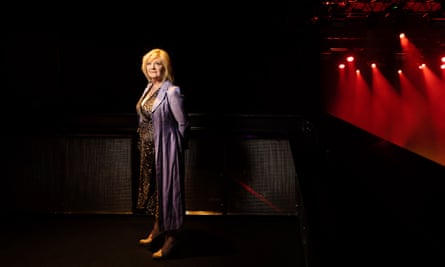
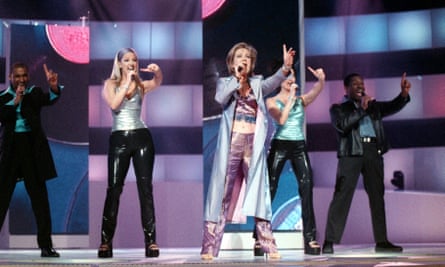
French’s entry, which came with the disastrous title Don’t Play That Song Again, was an Abba-adjacent power ballad and consequently very on-brand for Eurovision. She finished 16th. “And I’ll say it before you do: that was the lowest the UK had ever come at that point. I said to one journalist afterwards – I think he was from the Evening Standard – that I blamed the British beef crisis. I was joking, of course, but everyone came back and said: ‘No, your song was just a pile of poo.’”
Now 58, French hosts a big Eurovision party in London each year with Radio 4’s Paddy O’Connell; various Eurovision alumni attend. “Career suicide?” she says. “It depends how you look at it. At first, yes, it was hard. I’d been hoping to go into musical theatre, but coming 16th didn’t really help with that. But it gave me other opportunities – I still play shows all over the world. May is my favourite month, as I’m always busy then; the media always want to talk to me. I’d love to be part of the TV specials they’re filming now, but no one seems to be asking. Hey ho, that’s fine. I’m still here, still working. As it happens,” she adds, “I’m having lunch with Katrina later today. Guess what we’ll be talking about?”
Over the years, the UK entrant has been chosen in one of two ways – either via an internal selection process or by allowing TV viewers to vote. The names of the selection shows have changed: there’s been Making Your Mind Up (2004-07, named after Bucks Fizz’s 1981 winner) and Eurovision: Your Decision (2008). By 2009, they were possibly getting a little desperate, if the show’s title was anything to go by: Eurovision: Your Country Needs You.
Back in 2007, Making Your Mind Up fielded hopefuls including East 17’s Brian Harvey and Justin Hawkins from the Darkness. The viewing public, in its wisdom, chose Scooch.
“We thought that Justin Hawkins had it in the bag,” Scooch member Natalie Powers says, “and we never expected to win. So when we did – well, it was a bit of a surprise, put it that way.”
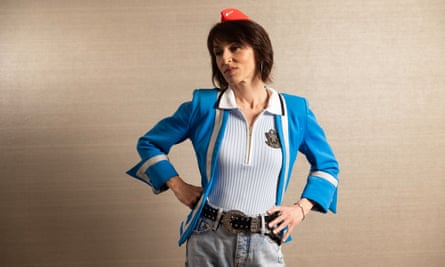
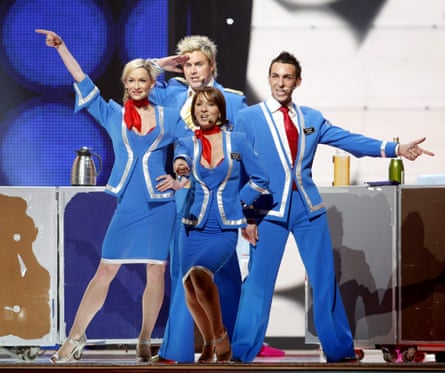
Eurovision had never really been on Scooch’s radar. Originally formed by the management team behind Steps, who were seemingly intent on making them sound as much like Steps as possible, they had a couple of hits in the early 2000s before Powers’ unplanned pregnancy derailed them.
“I was very much given the choice by management of either keep the baby but don’t be in the band, or be in the band and give up the baby,” Powers says. “I chose the baby.”
By the time the BBC came calling, her son was at school and Powers was keen to resume her career. “We just wanted to have fun with it,” she says.
Scooch’s effort, Flying the Flag (For You), was a high-tempo Butlin’s-friendly paean to the purported pleasures of budget airline travel. “From London to Berlin/All the way from Paris to Tallinn,” Powers sang. The band were dressed as cabin crew and danced like planes while performing safety demonstrations. Intermittently, member David Ducasse asked whether passengers would like some of his “salty nuts” before suggesting, during the song’s final descent, they might like “something to suck on for landing”.
“I don’t think that sort of innuendo translated particularly well in Bulgaria,” Paul Jordan notes. He was right: Scooch failed to tickle Europe’s fancy. They came 22nd. (The song did subsequently reach No 5 in the UK charts, “which was quite a big deal”, Powers notes.)
“I’m very competitive so I was gutted not to win,” says Ducasse, 46, who now works for the civil service. “But I love that Eurovision has given us a kind of immortality. It’s like having a Christmas hit. Every December you’ll hear Mariah Carey; every May you’ll hear us. I’m proud of that.”
after newsletter promotion
His Scooch band members Caroline Barnes and Russ Spencer have both since dabbled in musical theatre, while Powers, 45, co-runs a talent academy for children in Buckinghamshire. They all remain, she says, “great friends”. When asked how Eurovision has affected her life, there is laughter. “I get about £27 a year in royalties!”
When James Fox was asked to compete for the chance to represent the UK, in 2004, he was 27. “I’d been gigging since the age of 16, and I’d already done [the BBC singing competition] Fame Academy,” he says of a career that had yet to take off. He agreed, “because I thought it would put me in the shop window. Also, I was following Jemini’s nul points. My manager said to me: ‘How bad can it get?’”
Fox’s Hold on to Our Love, an earnest, no-frills love song, finished 16th. As a result, the deal he’d had with Sony fizzled out. “You go from being the centre of the storm to absolutely nothing,” he says. “The day after, my world was just empty. I went home to my flat, and sat on the sofa, thinking: ‘What now?’”
After Fox came Andy Abraham (2008) and Lucie Jones (2017), both from The X Factor. Javine Hylton (2005) had narrowly missed out on a place in Girls Aloud when they were formed on ITV’s talent show Popstars, while Jade Ewen (2009), who hadn’t done reality TV, had briefly been a member of Sugababes. Each brought with them levels of professionalism, but even they didn’t make much of an impression (although Ewen did finish fifth).
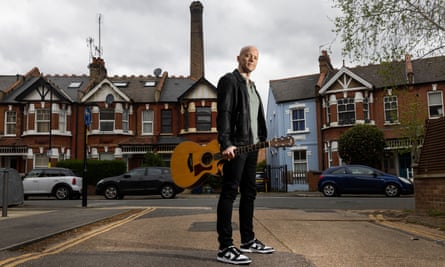
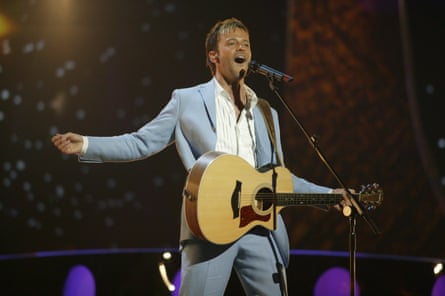
The BBC, by now possibly a little desperate, extended the invitation to legends. In 2012, Engelbert Humperdinck, then aged 75, performed Love Will Set You Free, a rather turgid romance that even a voice as big as his couldn’t enliven. He finished 25th. A year later, the poisoned chalice was passed to Bonnie Tyler.
This wasn’t the first time she’d been approached. “Do you know what?” says Tyler, 71. “The BBC first asked me to do Eurovision back in 1983, but I was number one at the time with Total Eclipse of the Heart. I was far too busy!” (An outfit called Sweet Dreams appeared in her stead; they came sixth.) “Besides,” she adds, “I really think the competition should be about new talent.”
And yet there was Tyler, in her 60s, flying the union jack. Why? “Well, see, the BBC had heard this track, Believe in Me, from my new album, which they thought would be good for the show. Desmond Child wrote it, and he’d written for Bon Jovi. I agreed to do it because it was a good way to launch the record.” She performed in inimitable Bonnie Tyler fashion. “Some of the judges, they said to me: ‘We love you, Bonnie!’ But they still didn’t vote for me!”
Tyler survived untarnished – she came 19th – because she had a successful career to fall back on, while acts such as Daz Sampson or Jemini, for whom the competition will always be their peak, tend not to. This is part of the show’s exquisite cruelty: its potential to launch you into the stratosphere or, more likely these days, bury you alive. In 2015, Electro Velvet fell, through no fault of their own, into the latter camp. A duo comprising Bianca Nicholas, who has cystic fibrosis and has since stepped back from the spotlight, and Alex Larke, then a 35-year-old session musician, they offered up Still in Love With You, a song informed by swing, the jazz form popular in 1920s America. “Electro swing, I think they called it,” Larke says. “Makes it sound more modern.”
In many ways this was ideal Eurovision fodder, but they scored just five points and came 24th. The song later reached No 114 in the UK charts. “All that work, five months of intense preparation and media attention, only to come that low,” Larke says, sighing. “It was demoralising. They paid us, I think, the princely sum of £5,000, which isn’t very much for five months’ work. When it was clear that the song hadn’t connected, I just wandered around backstage for a bit. There was a lot of champagne flowing – on reflection, it was probably cava – and I got shit-faced.”
His night, and by extension his pop career, was over by the time the clock struck 12. “Your contract ends at the stroke of midnight, and you’re bundled on to the first flight back the morning after. My wife was at work when I got home, and I don’t think I’ve ever felt quite so alone. The phone stops ringing. You never hear from anyone again.”
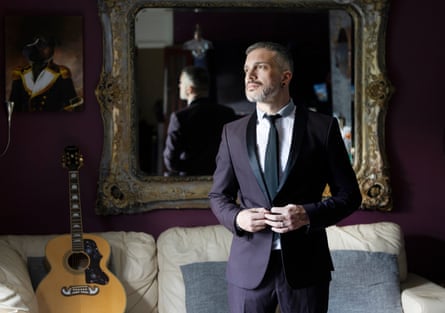
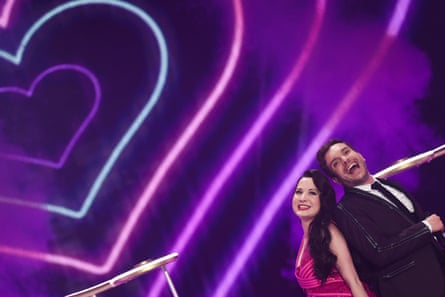
While James Fox went on to have a successful career in musical theatre – he has appeared in the West End and on Broadway – Larke resumed his session work. He now runs his own studio in Welwyn Garden City.
“The business was going great until the pandemic hit, after which I was trying to make ends meet using credit cards,” he says. He saw on Facebook that the Sun was looking for lockdown stories in which people were struggling financially. Suspecting that Eurovision’s lingering cachet would pique their interest, he called them. “Not my proudest moment, but then they were paying £150. I needed the money.” He did bounce back, ultimately, and his studio has since reopened.
It is possible, just occasionally, to bomb and come out smiling. On paper, singer-songwriter SuRie was an unusual choice in 2018: a graduate of the Royal Academy of Music, who had previously appeared in both an Arthur Miller play and a hip-hop musical. Her first taste of Eurovision was as a backing dancer for the Belgian act Loïc Nottet in 2015. She jumped at the chance of taking part herself, she says, because recent entrants Javine and Lucie Jones had been notably strong.
“The production values were getting so good – the quality of singers, too – so I just thought: ‘Why not?’”
Her song, Storm, fell squarely into big ballad territory, and she filled it with cinematic anguish. Her performance is worth seeking out online. Halfway through it, a man invades the stage and grabs the mic. SuRie stumbles back, dazed, while the intruder – who had pulled this sort of stunt on other TV shows – is bundled off by security. She sees that the microphone has rolled conveniently back to her feet, picks it up and doggedly carries on. The first full lyric she sings upon its resumption is: “Hold your head up/Don’t give up.”
“A friend texted me afterwards to say: ‘I don’t know how you planned that, but it was genius!’” the 34-year-old laughs. Initially there was talk that she’d have to perform it again, but this was live television, and besides, she’d been terrific. The crowd had gone wild for her.

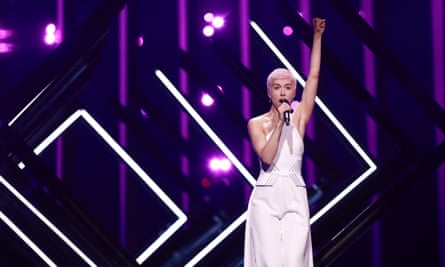
“People were telling me I should prepare myself because I was going to win, if only from the sympathy vote,” she says. She came 24th. “It was just dire. There’s a photo of me with a glass in my hand, looking ashen.”
But the stage invasion went viral and people remember SuRie warmly. Now a staunchly independent artist, she releases a new album this month of elegant piano-led songs and, like almost everyone else who has appeared on Eurovision over the years, sees only the positive. It’s on her CV for life, and indelibly online, too, and she’s fine about it.
“Oh, I cannot stress this enough,” she says, “but it really was the most wonderful thing to have been a part of. To see nothing but positivity from nations that are supposed to be enemies – all these flags flying right next to each other – is an amazing thing. I’ve never seen a community like it, one that’s more inclusive, more celebratory of everyone just being themselves.
“Eurovision,” she says, “is something I’ll be grateful to for ever.”
What of this year’s event? Should we be preparing again for the inevitable disappointment? Perhaps not – because there’s growing evidence that the UK is getting its act together at last. Both 2022’s entry, Sam Ryder, and this year’s, Mae Muller, were put forward by Tap management, the team behind Dua Lipa, Lana Del Rey and Ellie Goulding. Is this a sign that we’re belatedly taking the competition more seriously and offering up better songs and more credible artists? Perhaps, says Blue’s Duncan James.
“I always thought that the longer we didn’t win, the more as a country we became disheartened by it,” James says. “So Sam winning it last year, well, that just reignited the nation’s love for it, didn’t it? Now, suddenly, everyone’s excited again.”
His mistake here – suggesting that Sam Ryder won in 2022 – is perhaps understandable. Ryder actually finished in second place, behind Ukraine. Liverpool is hosting the event because Ukraine, of course, cannot. Last year’s winners, the Kalush Orchestra, did not go on to enjoy huge international success, but Ryder – a man who can resemble a sock puppet being operated by the world’s most excitable hand – has. He’s been the perfect ambassador for the competition: likable, garrulous, maniacally happy. He’s Eurovision in human form.
And so maybe, just maybe, that quarter-century of hurt is at an end. Back in 1997, Katrina and the Waves rode off into the sunset – and took the sunset with them. We’ve been the butt of the joke ever since, but it’s time now to stop laughing.
"hear" - Google News
May 06, 2023 at 03:26AM
https://ift.tt/tHCkNuJ
‘The phone stops ringing. You never hear from anyone again’: the UK’s Eurovision flops on 25 years of hurt - The Guardian
"hear" - Google News
https://ift.tt/KYNCwh3
https://ift.tt/HA0Kh4M
Bagikan Berita Ini














0 Response to "‘The phone stops ringing. You never hear from anyone again’: the UK’s Eurovision flops on 25 years of hurt - The Guardian"
Post a Comment